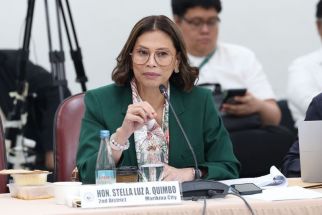The legacy of RA 8240

There are several laws crafted by our legislative bodies that proved to be milestones in the economic and political development of our country. One of them with which I am quite familiar is the Deregulation of the Oil Industry.
With its enactment, government subsidy of oil prices was stopped and oil prices were allowed to rise or fall in relation to fluctuations in the world market. As the oil industry was opened up, new players joined and generated jobs and additional revenues for the government.
Another example is the Local Government Code which granted broader power and authority to local government units to chart its own course and devolved a number of basic services which were before highly centralized in the National Government.
But there are also laws that hindered the economic growth and projected a negative image of the country as a place where new investments in certain sectors are not welcome and rules of doing business are discriminatory.
One such law is RA 8240 which provides the excise tax structure for cigarettes and liquor.
Infamous Annex D of RA 8240
Lobbying is an accepted activity in a fair democratic legislative process. However, for some reason, lobbying in Philippine context is perceived differently.
There are groups that are effective in promoting specific interests or agenda thru lobbying. And there are laws where “hand prints” of lobbying are very evident.
Experts and those in the know of the workings in Congress are quick to state that Annex D of RA 8240, listing specific brands with “classification freeze” protection is an example of the result of an effective lobbying activity.
According to Congressman Abaya, laws with annexes are quite few, particularly an annex that specifically list and identifies the items covered by the provision of the law. It seems, however, that Annex D of RA 8240 is an exception.
Annex D list the brands of cigarettes belonging to Lucio Tan’s Fortune Tobacco and multinational Philip Morris and classified with tax rate on the basis of retail prices set in 1996. These brands enjoy “classification freeze” privilege, meaning the classification and tax rate of these listed brands are not subject to change despite increases in retail prices during the past 15 years.
An example is Marlboro, a brand listed in Annex D, which now retails at P32 per pack is classified based on 1996 retail price and is taxed at P12 per pack. A brand not listed in Annex D with same retail price at P32 per pack is classified and taxed at P28.30 per pack.
With the “classification freeze” protection provided by RA 8240 Annex D, Marlboro, which is taxed based on 1996 tax classification despite increases in retail prices since then, is realizing tax savings of P16.30 per pack – a boost in profit to cigarette manufacturer and loss of revenue to the government.
Uneven playing field
Clearly the effects of RA 8240 discriminatory protection given to brands existing in 1996 also prevented the entry of new players in the cigarette industry. The “uneven playing field” leads to the domination of the market by brands owned by Lucio Tan’s Fortune Tobacco and Philip Morris.
This market domination culminated into a monopoly with the merger of these two companies into what is now called PMFTC, which controls over 90 percent of the cigarette market.
Lost government revenues; profit gains by monopoly
In addition to the “uneven playing field” consequence of RA 8240, the excise tax collection under the existing structure is not keeping pace with the government needs as shown by the severe drop in excise tax collection as a percentage of GDP to 0.4 percent in 2009 as compared to 0.7 percent in 1997.
With the brands listed in RA 8240 Annex D that pay taxes based on 1996 retail prices, the government’s lost revenues since 1996 is estimated at over P140 billion. On the other hand, gross profit of multinational Philip Morris even before its merger with Fortune Tobacco has tripled in six years.
Still wondering where the lost government revenues went?
Tobacco monopoly is hurting the farmers
The tobacco monopoly created by the discriminatory protection of RA 8240 is actually hurting the tobacco farmers rather than protecting them, according to the Action for Economic Reforms (AER) study presented during the recent Ways and Means committee hearing.
AER cited that the price of raw tobacco during the 2009-2010 crop season or prior to the merger of Philip Morris and Fortune Tobacco was P95 per kilo. Immediately after the merger, the price of raw tobacco dropped to P73 per kilo during the 2010-2011 crop season, a decrease of 23 percent.
With the monopoly group as the only major buyer limits the options of the farmers to obtain higher value for their produce.
Clamor for scrapping RA 8240
Finance Secretary Cesar Purisima stated that the dismantling of the annexes and the price classification freeze on certain brands are at the core of the excise tax reform proposal being pushed by the administration. According to Purisima, the annexes and the price classification freeze is only favoring PMFTC to the detriment of public health. Department of Finance (DOF) is supporting House Bill 5727 authored by Rep. Joseph Emilio A. Abaya of Cavite to replace RA 8240.
“Effective” lobbying created the law that provided generous protection to a few vested interests for over 15 years. Today, the various groups supporting the move to reform excise tax on sin products can also do their own “lobbying.”
The big difference though this time, is that this change will be for the benefit of the Filipino people that need better health service, for tobacco farmers to have better value for their produce, and for the country to have more opportunities to economically grow with new investments.
Facebook and Twitter
We are actively using two social networking websites to reach out more often and even interact with and engage our readers, friends and colleagues in the various areas of interest that I tackle in my column. Please like us at www.facebook.com and follow us at www.twitter.com/ReyGamboa.
Should you wish to share any insights, write me at Link Edge, 25th Floor, 139 Corporate Center, Valero Street, Salcedo Village, 1227 Makati City. Or e-mail me at [email protected]. For a compilation of previous articles, visit www.BizlinksPhilippines.net.
- Latest
- Trending

























